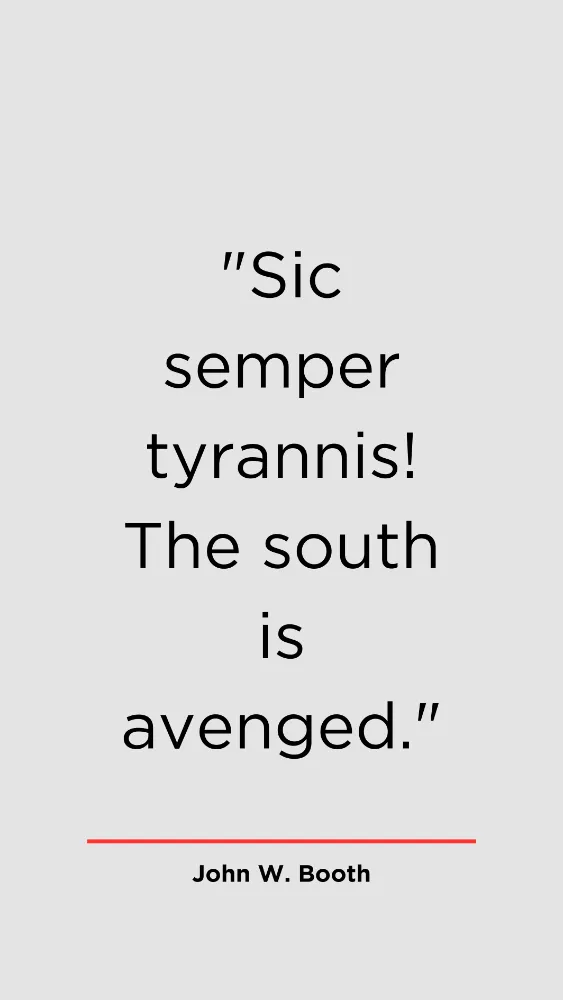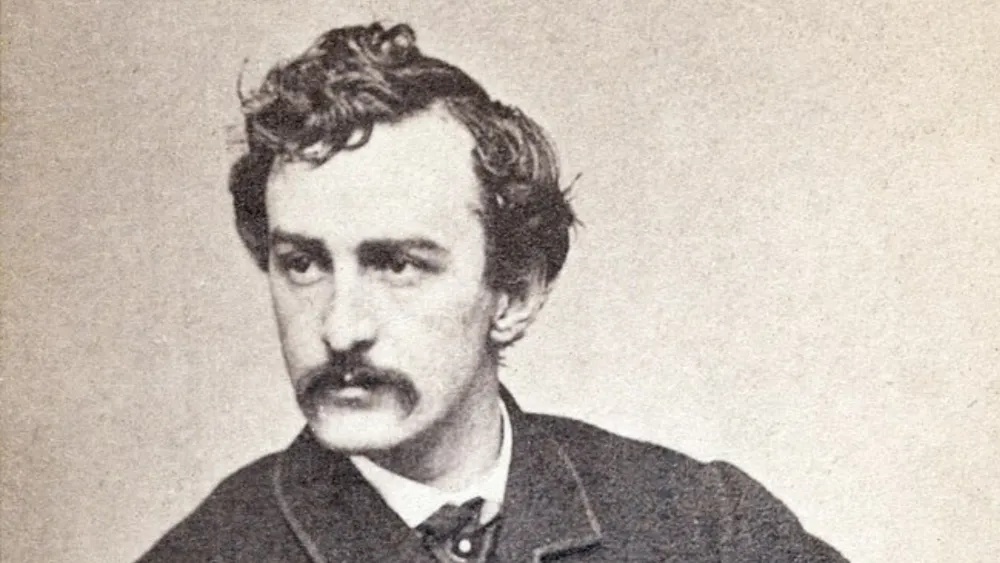John W Booth was an influential actor in the 1800s who did a terrible thing. On April 14, 1865, he killed the President of the United States, Abraham Lincoln, while Lincoln was watching a play at Ford’s Theatre in Washington, D.C. Booth came from a well-known family of actors in Maryland.
Besides being an actor, Booth supported the Southern states during the Civil War and didn’t like President Lincoln. He was upset about the recent end of slavery in the United States and spoke out against Lincoln for it. This disagreement with Lincoln’s decisions led Booth to take a drastic and violent step, leading to a very sad event in American history.
Building Family and Ambitions in Harford County
John Wilkes Booth’s parents were Junius Brutus Booth, an influential British actor known for performing Shakespearean plays, and Mary Ann Holmes, his mistress. They came to the United States from England in 1821 and bought a farm near Bel Air, Maryland, where John Wilkes Booth was born on May 10, 1838. He was the ninth child in a family of ten.
Booth got his name from a distant relative, English politician John Wilkes. Despite being born into a well-known family, there were some family complications. Junius Brutus Booth had abandoned his wife, Adelaide Delannoy Booth, and moved to the United States. Thirty years later, authorities granted Adelaide a divorce in 1851 due to Junius’s adultery. On John Wilkes’ 13th birthday, May 10, 1851, his parents legally married.
Influential Dynamic Between John W Booth and Edwin
Booth’s father built Tudor Hall, the family’s summer home in Harford County, in 1851. They also had a winter residence in Baltimore on Exeter Street. In the 1850 census, the Booth family was listed as living in Baltimore. It’s interesting to note that family tensions and ambitions may have influenced the actions of John Wilkes Booth later in life. Some believe that the competition and desire for success between John Wilkes and his brother Edwin, who supported the Union during the Civil War, played a role in shaping their destinies – Edwin as an influential actor and John Wilkes as the assassin of Abraham Lincoln.
John W Booth: From Quaker Learning to Military Rigor
As a young boy, John was active and well-liked. He excelled in activities like horseback riding and fencing. Despite his popularity, he wasn’t particularly focused on academics. His headmaster at Bel Air Academy thought he had the intelligence but wasn’t eager to make the most of his educational opportunities.
Between 1850 and 1851, Booth attended the Milton Boarding School for Boys, a Quaker-run institution in Sparks, Maryland. Later, he went to St. Timothy’s Hall, an Episcopal military academy in Catonsville, Maryland. At these schools, students studied classical works and, at St. Timothy’s, wore military uniforms while adhering to a strict regimen of drills and discipline. Booth left school at the age of 14 after his father’s death.
A Glimpse into Faith: Emerging Interests in Theater and Politics
During his time at Milton Boarding School, Booth encountered a Romani fortune-teller who predicted a gloomy fate for him, foreseeing a grand yet short life that would end badly. Booth took this prediction seriously, discussing it with family and friends during moments of sadness.
By the age of 16, Booth developed an interest in both theater and politics. He represented Bel Air as a delegate at a rally organized by the Know-Nothing Party, supporting their anti-immigrant candidate for Congress, Henry Winter Davis, in the 1854 elections. Booth aimed to follow in the footsteps of his father and actor brothers, Edwin and Junius Brutus Jr. He started practicing elocution daily in the woods around Tudor Hall and delved into Shakespeare’s works.
Martial Law and the Suspension of Habeas Corpus
John W Booth strongly opposed abolitionists who aimed to end slavery in the United States. Witnessing the hanging of abolitionist leader John Brown on December 2, 1859, Booth, disguised as a Richmond Grays militia member, attended the event to prevent a possible rescue attempt. Brown’s stoic acceptance of death impressed Booth, who expressed satisfaction with his fate. When Lincoln became president in 1860, Booth drafted a speech supporting the South and slavery. As the Civil War started, Maryland wrestled with secession, leading Lincoln to impose martial law. Booth, along with many Marylanders, deemed Lincoln’s actions unconstitutional, aligning with Chief Justice Taney’s ruling in Ex parte Merryman.
Booth’s Oath to the Union Amidst Controversy
In the 1860s, John W Booth traveled extensively, performing in both the North and South, including places like New Orleans. His sister Asia revealed that he used his acting tours to smuggle the anti-malarial drug quinine to the South. This is where it was scarce due to the Northern blockade. Despite being pro-Confederate, Booth’s family, like many in Maryland, had differing opinions. Booth openly expressed his love for the South and his strong dislike for President Lincoln.
Booth and Edwin’s Clash Over the Civil War
As the Civil War progressed, he clashed with his brother Edwin, who avoided performing in the South. Moreover, he didn’t share John Wilkes’ intense criticism of the North and Lincoln. In 1863, Booth’s problems escalated when authorities arrested him in St. Louis. This is because he expressed a wish that the President and the government would go to hell. They charged him with making “treasonous” remarks. Yet, he secured his release by pledging allegiance to the Union and paying a substantial fine.

John W. Booth’s Hidden Alliances and Secret Affairs
Booth might have been part of a secret group called the Knights of the Golden Circle, aiming to expand territories as slave states. In February 1865, Booth started liking Lucy Lambert Hale, the daughter of U.S. Senator John P. Hale of New Hampshire. They got engaged secretly, and Booth got his mother’s approval for their wedding plans. In a letter, his mother supported him, saying, “You have so often been dead in love, be well assured she is really and truly devoted to you.” On February 13, Booth made a Valentine’s card for Lucy, expressing his “adoration.” What Lucy didn’t know was that Booth strongly disliked Lincoln.
Whispers of Regret and Final Moments
Following the assassination of President Lincoln, John Wilkes Booth sought refuge in a tobacco barn on Garrett’s farm. Interrogated by Lieutenant Edward D. Conger, Booth refused to surrender and declared his intent to fight. As the barn was set ablaze, Sergeant Boston Corbett shot Booth, claiming it was in self-defense. Dragged from the flames, Booth died three hours later, aged 26, from a neck wound that had pierced three vertebrae.
In his final moments, he reportedly whispered, “Tell my mother I died for my country,” and expressed regret, stating, “Useless, useless,” before succumbing to asphyxiation. Booth’s possessions included a compass, a candle, pictures of women, and a diary with a damning entry blaming Lincoln for the nation’s troubles.
Edwin Booth disowned his brother, emphasizing that John was dead to the family. A letter written by John, found after his death, outlined his belief in the justice of his cause, his support for the South, and his opposition to Lincoln’s war policy, which he deemed a threat to Southern rights and institutions. Federal troops seized and published the letter, revealing insights into Booth’s motivations.
Lessons from John Wilkes Booth
John Wilkes Booth’s life teaches essential lessons on the profound impact of choices and the complexity of human motivations. It also highlights the consequences of extreme beliefs, the fragility of fame, and the dangers of unchecked prejudice.











